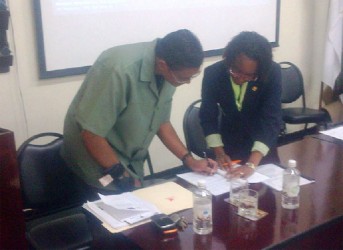The Food and Agriculture Organisation (FAO) in collaboration with the European Union (EU) and the Guyana Forestry Commission (GFC) yesterday launched a US$65,000 Forest Law Enforcement Governance and Trade Programme (FLEGT) Support Programme which may enable timber traders to expand to new international markets.
The programme, which is being funded by the EU and implemented through the FAO, is intended to support an eight-month project entitled: ‘Executing Initial Aspects of the Guyana Roadmap for the EU Forest Law Enforcement Governance and Trade Programme (FLEGT) Voluntary Partnership Agreement (VPA) through developing a Communication Strategy and scoping impact of an EU FLEGT VPA for Guyana’.

Commissioner of the GFC James Singh yesterday said that negotiations for the programme concluded last December includes the dissemination of information to stakeholders as well as the assessment of impacts which resulted from the implementation of the VPA.
FAO Country Representative Dr Lystra Paul explained that the project is a big deal since failure to fall in line with international standards may be detrimental to traders in timber and timber related goods.
In 2003 the EU adopted a FLEGT Action Plan to address the issue of illegal timber in global markets and to stop it from entering the European Market. Seven years later, the block adopted the Timber Regulation which prohibits the placing of illegal timber on the EU market.
This regulation took effect on March 3. Paul indicated that more and more large international markets, including the United States (US) and Australia, have begun to stipulate that traders in timber and timber products comply with international regulations before trade in such goods is initiated
As such, Guyana’s ability to tap into these very important markets will be determined by how well its stakeholders adhere to the stipulated regulations. She alluded to the fact that at least two companies in Guyana, Barama Company Ltd being one of them, has been certified by the EU according to these criteria and are now able to trade with the EU. As such, Barama and any other entity which becomes so certified will therefore not only benefit from accessing the EU market, but the US and Australian markets whose standards may be similar to those of the EU.
The increased international trade will inevitably lead to increased revenue for Guyana.
The level of certification achieved so far however is far from enough, said Paul, who said there is need for much more work to be done in terms of spreading awareness and informing shareholders of the importance of getting on board.
As such the programme is aimed at facilitating consultations which will ensure that stakeholders understand why it is necessary to comply and what they need to do to comply. She said the project is a communication strategy to make sure that the information gets out to all stakeholders.
“This whole exercise is to involve everybody and make sure they understand. We’re talking about participation by all stakeholders, not just the big timber companies, but also the Amerindians and small loggers who are very much involved in logging. Part of the initiative is also aimed at ensuring that all involved are treated fairly and that they are not taken advantage of.”
Mohindra Chand, Head of the Guyana Manufacturing and Services Association Forestry and Wood Products sub-sector, explained that areas to be improved include the good governance of our forest resources. He noted that the push for development can lead to the misuse and overuse of forest resources which can have devastating implications for future generations.
Paul pointed out that that it has generally been hard to effectively regulate the sector. Illegal logging has long been rampant in Guyana and has been an issue of concern. Even many small scale loggers have and in some instances continue to fail to abide by municipal regulations.
Paul said however that since the implementation of the ACP FLEGT programme there has been a change in policies and practices by those responsible for the production and supply of such goods.
The second aspect of the project, according to Paul entails a Scoping Impact Assessment “which will examine what steps have been taken thus far, how steps have taken impacted the sector and the level of compliance to both local and international regulations.” Guyana, the only country part of the VPA which has conducted such an assessment, will therefore be building on work which has already been done. Paul said “once this is done there will be a clear indication of what more needs to be done,”
She said that this project must be taken seriously since failure to do so will result in lost trade and revenue. “If we don’t get it right Guyana will not be able to trade its forest products abroad, especially to the European market, which is one of the largest markets on the international scene. This translates into the potential of loss revenue for the country.”




